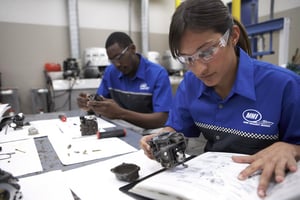
It’s funny: The closer you get to high school graduation, the longer classes seem to drag on. Wouldn’t it be nice if you could just start technical college already?
Actually, you can.
Not everyone realizes it, but there are ways to earn college or post-secondary credit for tech school while you’re still in high school. And there are big advantages to getting a head start. The sooner you earn credits, the sooner you graduate; the faster you finish, the faster you’re earning money and advancing in your career. Plus, training early will warm you up for tech school and help you know what to expect.
Wondering how to get a jump on tech school? Read on. We’ve laid out four simple ways to earn tech college credit while you’re still in high school.
1) Supplement high school courses for tech school credit
No, it’s not a gimmick. It’s possible to earn full college credit while you’re still in high school. If you’re taking a qualifying AP course in high school, it could count toward a post-secondary tech school degree.
These courses can put you miles ahead of your friends—and save you a massive chunk of time and money. After all, every class you can transfer to a post-secondary school is one you don’t have to take or pay for later on.
In some cases, your high school may also let you travel to a nearby tech college and take classes throughout the day. Why not give it a shot? Chances are if you’re passionate about breaking into an auto tech career, your counselor will be excited to help you build a schedule that puts you on track.
2) Go online
Sure, some auto tech careers require physical tasks, such as cranking wrenches and prying nuts loose. But they also require advanced technical skills and knowledge of complex systems. Just think of the strategy and critical thinking that goes into rebuilding a transmission or diagnosing an electrical issue.
Online resources can give you foundational knowledge that your post-secondary tech classes will build upon later. Remember, every step you can complete online is one less you have to take in college.
Luckily, there’s now a multitude of ways to get ahead online. For instance, you can book core classes with online community colleges. This is a great way to start building a foundation under your feet, as it sets the stage to becoming an expert.
Just pulling in basic knowledge from these courses can put you miles ahead. But if you want credits to transfer, it’s worth checking with college counselors before signing up.
Even if you’re not picking up official credits, there are free online resources to sharpen your skills. Take advantage of them. Read blogs, watch webinars, and follow industry leaders on social media. Every little tidbit of knowledge you pick up will inch you closer to mastering your career.
3) Take on apprenticeships and internships
Let’s state the obvious: Tech careers are rooted in action. And so are some of the most powerful learning opportunities.
With apprenticeships and internships, you learn by getting hands-on and working side-by-side with the pros. Not only do these opportunities unlock a new level of understanding, but they also shine light on what parts of a career you enjoy or dislike. That makes it easier to decide if you want to focus on a specific transportation tech career or whether you’re entering the right field.
Fittingly, this is another area where your high school mentors can deliver. Tell them you’re interested in a transportation tech career and ask them if there are internships they recommend.
Want to find apprenticeships or internships on your own? Here are some solid sites that post new opportunities:
4) Talk to your high school leaders
Your high school counselors and teachers want to see you succeed, and chances are they’ve built relationships with local tech colleges. You can jump ahead by asking your high school leaders if the school has an articulation agreement with any tech colleges. Articulation agreements are partnerships between schools.
Often, post-secondary tech schools and high schools will identify which of their classes have overlapping coursework. That way, when a high school student completes coursework in a designated class, the post-secondary school will award them credit. That means you don’t have to take classes over when you’ve already learned the content once—saving you money, time, and boredom.
Chances are your school has already built connections with post-secondary tech schools and colleges. All you need to do is ask about the details.
Formulate a plan for tech school
The earlier you start planning, the sooner you’ll be on your way to establishing your career. Want to start paving your path to an auto tech career today? Get started today by reading our Roadmap to Transportation Technology Careers.




Comments